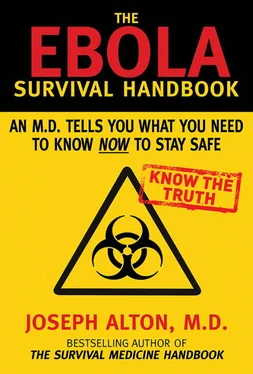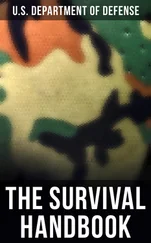With regards to protective gear, no affordable gear is fully safe when it comes to the advanced Ebola case. CIDRAP states that respirator masks (otherwise known as N95 masks) may be acceptable for the early stages of the disease. The complicating issue is that the quantity of virus in a late-stage patient may be so high that it penetrates the mask, which is designed to block 95 percent of particles above 0.5 microns in size (an N100 respirator masks blocks 99.7 percent, but is 15 times more costly). For advanced stages of the disease, a full hood with a powered air-purifying respirator (PAPR) is needed. These can cost $1,000 each, although some elements are reusable.
When you take into account all the items your outfit would include, it is prohibitively expensive to have all the personal protection equipment needed for care of the Ebola patient from first symptoms to recovery, especially when you consider that you might need to change several times a day. This consideration is a strong argument for my earlier assertion that Ebola patients must be transferred to high-level hospitals as soon as possible.
Having said all this, many items will give some protection and are worthy of consideration for handling various infectious disease issues. In the next chapter, we’ll talk about these items and how they fit in your sick room supplies.
NOW YOU KNOW…
The best way to protect yourself and your loved ones against Ebola is to be proactive with preventative measures. Guidelines exist for travelers to West Africa from organizations involved in containing the epidemic. In addition to washing your hands and using hand sanitizer, be careful where you travel and who you encounter.
Try to get involved in organizations working to prevent the spread of Ebola, and if none exist that fit the bill, consider starting one of your own. Donate money, if you can, to advance Ebola research or to send supplies to epidemic areas.
Above all, use your head. There are no quick cures when it comes to Ebola. Be skeptical if anyone promises you there are.
With commercial air travel, there just is no way that you’re going to be able to contain anything or anyone anywhere for too long. The fact that it took Ebola nearly forty years to infect the United States is a pretty impressive example of successful containment.
Once here, it didn’t take long for the virus to infect two health workers. The frustration here is those two cases would not have happened if there were travel restrictions from West Africa. Despite this, the government is not yet ready to consider this important option. Instead, they have instituted a screening process for travelers from the epidemic zone. According to the CDC, “Individuals who are determined to be at any potential risk will be actively monitored.”
Humphrey Taylor, chairman of the Harris Poll, has said, “As the Ebola epidemic in West Africa continues to grow very rapidly, and the first American Ebola victims are being treated in this country, there is overwhelming support for strict screening of all new arrivals from the countries affected.”
In fact, according to a recent poll, 58 percent of Americans would support a ban on incoming flights from Liberia, Guinea, and Sierra Leone. Another 22 percent couldn’t decide if a travel ban would help matters or if proper screenings in airports might be enough. Only 20 percent believed a travel ban is a bad move. Despite this sentiment in support of travel restrictions from West Africa (not to), it’s unlikely to ever happen.
Travel screening might be adequate, but only if the people screened are flying directly from countries that screen to the United States, without layovers in countries that don’t screen Take the example of NPR producer Rebecca Hersher. She had a different story to tell when she traveled the same route Mr. Duncan had taken. Hersher reported in detail, via tweets, all the information she was given in Liberia—all the times her temperature had been taken. After she transferred flights in Brussels, however, it was as though Ebola never existed until she landed back in the States and tweeted that once her passport was checked and it was noted that she had come from Liberia, she would be detained until a representative from the CDC spoke with her and evaluated her.
Brussels was the weak link. With little or no screening, potentially infected people from West Africa (or anywhere, really) could enter the country and depart right to the United States if they weren’t visibly ill.
SHOULD TRAVEL TO AND FROM AFFECTED PARTS OF AFRICA BE BANNED?
Two sides of the argument exist. Hersher showed no signs of being sick, but why wasn’t she evaluated more fully in Brussels? Gaps in screening on multiple-stop flights could miss someone with early symptoms.
Screenings expected to cover about 150 passengers per day are now in place in New York City’s John F. Kennedy International Airport, Newark Liberty International Airport, Dulles International Airport outside Washington, DC, Chicago’s O’Hare International Airport, and Hartsfield-Jackson International Airport in Atlanta. As previously mentioned, these are the five American airports that welcome 94 percent of travelers from Liberia, Sierre Leone, and Guinea into the United States. “It’s not an effort that will be particularly disruptive to large numbers of people,” CDC director Frieden explains. “We think it is manageable.” The CDC also plans to send additional staff to the five airports to support the new screening measures.
TIP
With the proper screenings, the experts believe that travel is safe, including travel to and from West Africa’s Ebola-infected areas.
Many hope that screenings will suffice and that banning flights to and from stricken countries will not be the ultimate result. Director of Doctors Without Borders Christopher Stokes explains, “Airlines have shut down many flights, and the unintended consequence has been to slow and hamper the relief effort, paradoxically increasing the risk of this epidemic spreading across countries in West Africa first, then potentially elsewhere. We have to stop Ebola at [its] source and this means we have to be able to go there.”
I have no disagreement with stopping Ebola at the source, but how are restricting travel from West Africa and sending relief efforts to West Africa mutually exclusive? They aren't. Some argue that restricting travel from the Ebola zone will damage the economies there. My response is that the economies are already in shambles in those nations, and that there is no reason to stop sending flights full of caregivers and medical supplies where they are needed. What is needed, however, is a way to prevent the importation of new Ebola cases.
Dr. Tom Frieden of the CDC refers to travel bans as “solutions that are quick, simple and wrong.” Is the nation in agreement that it would be unfair to restrict West Africans from traveling to the United States? Twenty-two countries already do, including most African nations. In fact, Nigeria has successfully contained the epidemic with a travel ban, plus an incredibly stringent contact tracing program.
The concept of “fairness” relates to political correctness. The issue of travel restrictions should be as it is in other countries—a public health issue and not a political one. We cannot expect politicians to make the tough decisions between political correctness and public safety. Our top health officials are expected to do just that, however, and may have to before long to protect the health of US citizens.
IN THE MEANTIME…
With the proper screenings, the experts believe that travel is safe, including travel to and from West Africa’s Ebola-infected areas. Essentially, anyone who travels to or from those areas will be given health information about Ebola and instructed in how to monitor themselves for symptoms.
Читать дальше



![John Stieber - Against the Odds - Survival on the Russian Front 1944-1945 [2nd Edition]](/books/405234/john-stieber-against-the-odds-survival-on-the-russian-front-1944-1945-2nd-edition-thumb.webp)








